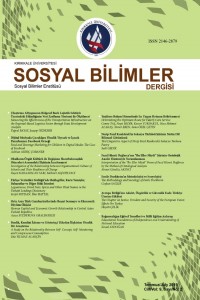Abstract
Avrupa Birliği ekonomik temeller üzerinde 1951 yılında kurulmuş olsa da zamanla giderek diğer alanlarda sağlanan işbirliği ile siyasi bütünleşme sürecine geçilmiştir. 1993 yılında Maastricht Antlaşması’nın yürürlüğe girmesi ile oluşan üç sütunlu yapı AB’de önemli değişiklikleri de beraberinde getirmiştir. Ancak Maastricht Antlaşması’nın meydana getirdiği üç sütunlu yapı, 2009 yılında yürürlüğe giren Lizbon Antlaşması ile kaldırılmış ve Adalet, Özgürlük ve Güvenlik Alanı’ndaki ulusal çıkarlar topluluk çıkarlarına dönüşmüştür. Böylece artan hukuki kesinlik, yeknesak mevzuat, karar alma sürecinde Avrupa Parlamentosunun daha fazla katılımı, Avrupalılaşma sürecine ve ortak Adalet, Özgürlük ve Güvenlik Alanı oluşturma çabalarının neden olduğu çelişkilere daha kapsamlı, meşru, etkin, şeffaf ve demokratik cevaplar geliştirmeyi kolaylaştırmıştır. Adalet, Özgürlük ve Güvenlik Alanı’ndaki işbirliğinin temeli 1976 yılında ortaya çıkarılan TREVİ Grubu ile atılmış ve zamanla bu alanda sağlanan işbirliği kriterleri Avrupa Birliği müktesebatına dâhil edilmiştir. Nitekim Türkiye’nin Müzakere Çerçeve Belgesi kapsamında gerçekleştirmesi gereken 35 fasıldan 24. Fasıl: Adalet, Özgürlük ve Güvenlik kriterlerini içermektedir. Bu çalışmanın amacı AB İlerleme Raporları çerçevesinde Adalet, Özgürlük ve Güvenlik Alanı’ndaki gelişmeleri ve bu gelişmelerin Türkiye’nin toplumsal ve kurumsal yapısında meydana getirdiği değişimleri ele almaktır. AB üyelik sürecinin Türkiye’nin gerek sosyal ve siyasi yapısında, gerekse demokratikleşme sürecinde önemli katkıları olduğu sonucuna ulaşılmıştır.
References
- - Avrupa Birliği Bakanlığı, AB İlerleme Raporları (1998-2016), https://www.ab.gov.tr, (Erişim Tarihi: 26.11.2017).
- - AKÇAY Belgin/ GÖÇMEN İlke, Avrupa Birliği: Tarihçe, Teoriler, Kurumlar ve Politikalar, Seçkin, Ankara, 2016.- AKALIN Mehmet, Europol: Türkiye’nin Operasyonel İşbirliği Tartışması, Türk İdare Dergisi, Sayı:482, 2015.
- - ÇALIŞKAN Özgür, Lizbon Antlaşması Sonrası Avrupa Birliği’nin Yeni Kurumsal Yapısı (Sunum Metni), http://mpra.ub.uni-muenchen.de/56591/, Ankara Üniversitesi, 2011.- ERDOĞAN Ramazan, Avrupa Birliği İlerleme Raporlarında 24. Fasıl: Güvenlik Politikalarının İçerik Analizi, Ankara Avrupa Çalışmaları Dergisi, Cilt:13 No:2, 2014.
Abstract
Although the European Union was established in 1951 on economic foundations, the process of political integration was gradually started with the cooperation provided in other fields. The three-pillar structure formed with the entry into force of the Maastricht Treaty in 1993 brought about significant changes in the EU. However, the three-pillar structure created by the Maastricht Treaty was abolished by the Lisbon Treaty which came into force in 2009 and the national interests in the area of freedom, justice and security turned into community interests. Thus, increased legal certainty, uniform legislation, greater participation of the European Parliament in decision-making, facilitated the development of more comprehensive, legitimate, effective, transparent and democratic responses to the Europeanization process and the contradictions caused by efforts to create a common Freedom, Justice and Security Area. The foundation of the cooperation in the field of Justice, Freedom and Security was laid with the TREVİ Group, which was unveiled in 1976, and the criteria for cooperation in this field were gradually incorporated into the acquis communautaire. Indeed, Chapter 24 of the 35 chapters must perform within the scope of Turkey’s Negotiation Framework Document: Justice, Freedom and Security includes criteria. For the purposes of this study, the EU Progress Reports Justice, Freedom and Security Area and developments in these developments in Turkey’s social and institutional structures to address the changes caused. In need of social and political structure of Turkey’s EU accession process, it has reached the conclusion that both contributed significantly to the process of democratization.
References
- - Avrupa Birliği Bakanlığı, AB İlerleme Raporları (1998-2016), https://www.ab.gov.tr, (Erişim Tarihi: 26.11.2017).
- - AKÇAY Belgin/ GÖÇMEN İlke, Avrupa Birliği: Tarihçe, Teoriler, Kurumlar ve Politikalar, Seçkin, Ankara, 2016.- AKALIN Mehmet, Europol: Türkiye’nin Operasyonel İşbirliği Tartışması, Türk İdare Dergisi, Sayı:482, 2015.
- - ÇALIŞKAN Özgür, Lizbon Antlaşması Sonrası Avrupa Birliği’nin Yeni Kurumsal Yapısı (Sunum Metni), http://mpra.ub.uni-muenchen.de/56591/, Ankara Üniversitesi, 2011.- ERDOĞAN Ramazan, Avrupa Birliği İlerleme Raporlarında 24. Fasıl: Güvenlik Politikalarının İçerik Analizi, Ankara Avrupa Çalışmaları Dergisi, Cilt:13 No:2, 2014.
Details
| Primary Language | Turkish |
|---|---|
| Journal Section | Makaleler |
| Authors | |
| Publication Date | July 1, 2019 |
| Submission Date | November 13, 2018 |
| Published in Issue | Year 2019 Volume: 9 Issue: 2 |

